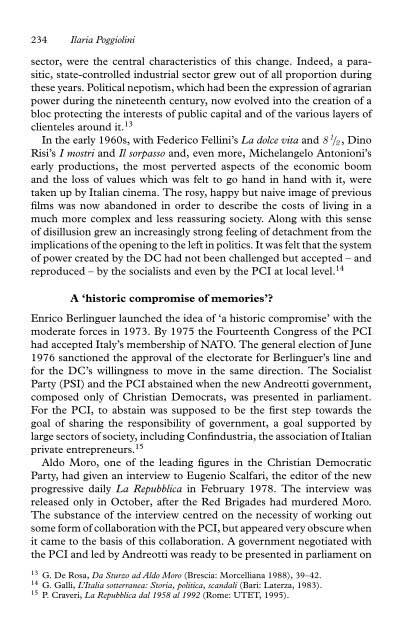Memory and Power in Post-War Europe: Studies in the Presence of ...
Memory and Power in Post-War Europe: Studies in the Presence of ...
Memory and Power in Post-War Europe: Studies in the Presence of ...
You also want an ePaper? Increase the reach of your titles
YUMPU automatically turns print PDFs into web optimized ePapers that Google loves.
234 Ilaria Poggiol<strong>in</strong>i<br />
sector, were <strong>the</strong> central characteristics <strong>of</strong> this change. Indeed, a parasitic,<br />
state-controlled <strong>in</strong>dustrial sector grew out <strong>of</strong> all proportion dur<strong>in</strong>g<br />
<strong>the</strong>se years. Political nepotism, which had been <strong>the</strong> expression <strong>of</strong> agrarian<br />
power dur<strong>in</strong>g <strong>the</strong> n<strong>in</strong>eteenth century, now evolved <strong>in</strong>to <strong>the</strong> creation <strong>of</strong> a<br />
bloc protect<strong>in</strong>g <strong>the</strong> <strong>in</strong>terests <strong>of</strong> public capital <strong>and</strong> <strong>of</strong> <strong>the</strong> various layers <strong>of</strong><br />
clienteles around it. 13<br />
In <strong>the</strong> early 1960s, with Federico Fell<strong>in</strong>i’s La dolce vita <strong>and</strong> 8 1 /2 , D<strong>in</strong>o<br />
Risi’s I mostri <strong>and</strong> Il sorpasso <strong>and</strong>, even more, Michelangelo Antonioni’s<br />
early productions, <strong>the</strong> most perverted aspects <strong>of</strong> <strong>the</strong> economic boom<br />
<strong>and</strong> <strong>the</strong> loss <strong>of</strong> values which was felt to go h<strong>and</strong> <strong>in</strong> h<strong>and</strong> with it, were<br />
taken up by Italian c<strong>in</strong>ema. The rosy, happy but naive image <strong>of</strong> previous<br />
films was now ab<strong>and</strong>oned <strong>in</strong> order to describe <strong>the</strong> costs <strong>of</strong> liv<strong>in</strong>g <strong>in</strong> a<br />
much more complex <strong>and</strong> less reassur<strong>in</strong>g society. Along with this sense<br />
<strong>of</strong> disillusion grew an <strong>in</strong>creas<strong>in</strong>gly strong feel<strong>in</strong>g <strong>of</strong> detachment from <strong>the</strong><br />
implications <strong>of</strong> <strong>the</strong> open<strong>in</strong>g to <strong>the</strong> left <strong>in</strong> politics. It was felt that <strong>the</strong> system<br />
<strong>of</strong> power created by <strong>the</strong> DC had not been challenged but accepted – <strong>and</strong><br />
reproduced – by <strong>the</strong> socialists <strong>and</strong> even by <strong>the</strong> PCI at local level. 14<br />
A ‘historic compromise <strong>of</strong> memories’?<br />
Enrico Berl<strong>in</strong>guer launched <strong>the</strong> idea <strong>of</strong> ‘a historic compromise’ with <strong>the</strong><br />
moderate forces <strong>in</strong> 1973. By 1975 <strong>the</strong> Fourteenth Congress <strong>of</strong> <strong>the</strong> PCI<br />
had accepted Italy’s membership <strong>of</strong> NATO. The general election <strong>of</strong> June<br />
1976 sanctioned <strong>the</strong> approval <strong>of</strong> <strong>the</strong> electorate for Berl<strong>in</strong>guer’s l<strong>in</strong>e <strong>and</strong><br />
for <strong>the</strong> DC’s will<strong>in</strong>gness to move <strong>in</strong> <strong>the</strong> same direction. The Socialist<br />
Party (PSI) <strong>and</strong> <strong>the</strong> PCI absta<strong>in</strong>ed when <strong>the</strong> new Andreotti government,<br />
composed only <strong>of</strong> Christian Democrats, was presented <strong>in</strong> parliament.<br />
For <strong>the</strong> PCI, to absta<strong>in</strong> was supposed to be <strong>the</strong> first step towards <strong>the</strong><br />
goal <strong>of</strong> shar<strong>in</strong>g <strong>the</strong> responsibility <strong>of</strong> government, a goal supported by<br />
large sectors <strong>of</strong> society, <strong>in</strong>clud<strong>in</strong>g Conf<strong>in</strong>dustria, <strong>the</strong> association <strong>of</strong> Italian<br />
private entrepreneurs. 15<br />
Aldo Moro, one <strong>of</strong> <strong>the</strong> lead<strong>in</strong>g figures <strong>in</strong> <strong>the</strong> Christian Democratic<br />
Party, had given an <strong>in</strong>terview to Eugenio Scalfari, <strong>the</strong> editor <strong>of</strong> <strong>the</strong> new<br />
progressive daily La Repubblica <strong>in</strong> February 1978. The <strong>in</strong>terview was<br />
released only <strong>in</strong> October, after <strong>the</strong> Red Brigades had murdered Moro.<br />
The substance <strong>of</strong> <strong>the</strong> <strong>in</strong>terview centred on <strong>the</strong> necessity <strong>of</strong> work<strong>in</strong>g out<br />
some form <strong>of</strong> collaboration with <strong>the</strong> PCI, but appeared very obscure when<br />
it came to <strong>the</strong> basis <strong>of</strong> this collaboration. A government negotiated with<br />
<strong>the</strong> PCI <strong>and</strong> led by Andreotti was ready to be presented <strong>in</strong> parliament on<br />
13 G. De Rosa, Da Sturzo ad Aldo Moro (Brescia: Morcelliana 1988), 39–42.<br />
14 G. Galli, L’Italia sotterranea: Storia, politica, sc<strong>and</strong>ali (Bari: Laterza, 1983).<br />
15 P. Craveri, La Repubblica dal 1958 al 1992 (Rome: UTET, 1995).
















